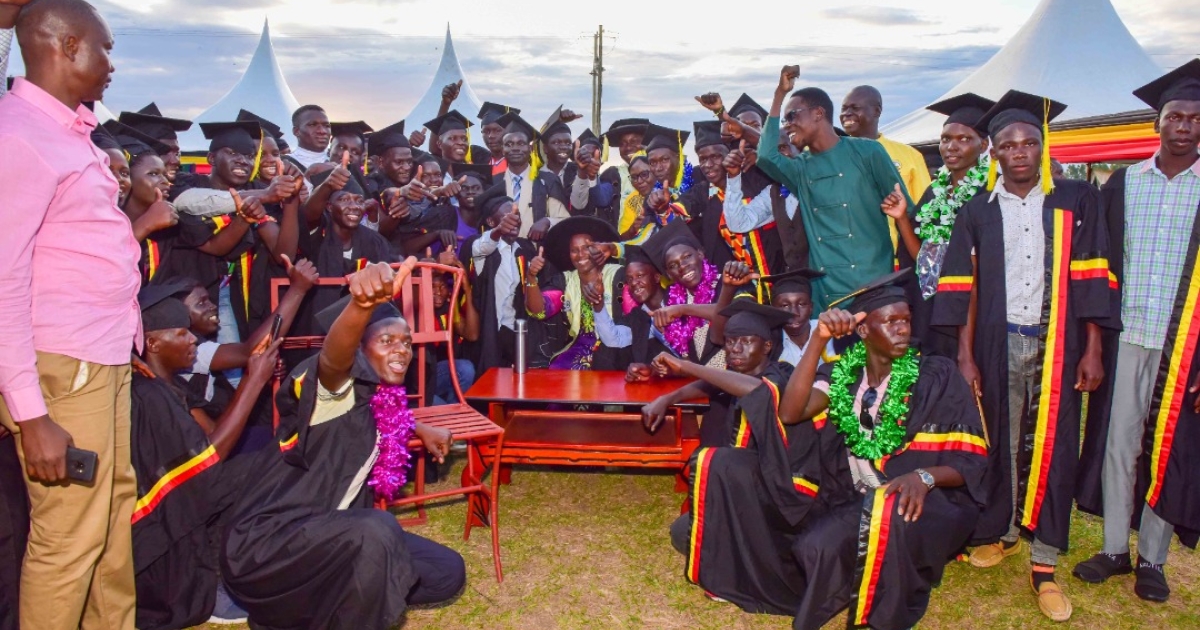
Today, thousands of young people poured into the nine Presidential Initiative on Skilling the Girl/Boy Child (PISGBC) facilities to sign up for the initiative.
The five divisions of Kampala City—Nakawa, Makindye, Kampala Central, Rubaga, and Kawempe—are home to the nine skilling centers.
The high number of young people wishing to sign up for the Presidential initiative indicates that they have truly embraced the program, according to Dr. Hillary Musoke Kisanja, the Private Secretary to H.E. the President of Uganda for the Youth, in Agriculture, Value Addition, and Export Promotion.
“We have so far registered about 5,000 youth in the nine skilling centers, and this number might even exceed our expectations,” Dr. Kisanja remarked earlier today.
He also cautioned Ugandans against politicizing the skill-building program, pointing out that the President wants to change the lives of youth and that the effort targets businesses that specialize in import substitution, such as carpentry and tailoring, among others.
“Our President is working to assemble a strong group of young Ugandans to support him in his fight to free Uganda’s economy. As a result, we are pleased with the turnout, the local councils that suggested these youngsters, and the parents who chose to attend and support this project rather than engage in political discourse,” he stated.
Dr. Kisanja went on to say that thousands of at-risk adolescents have already benefited from this program and have attested to the fact that it has changed their lives for the better.
“We train youth in a variety of trades, including building, electronics, knitting, needlework, carpentry, and many more. The President has asked that we establish new skill-building programs, including the ceramics skill-building program,” he stated.
Dr. Kisanja went on to say that the program is only available to Kampala’s most disadvantaged youth.
Nine (9) centers, including Wandegeya Market, Mulago Community Hall, Mutundwe-All Saints Church of Uganda, and Nakulabye-Our Lady of Fatima Catholic Church, are now implementing the program.
Other locations are Kigoowa-Ntinda, Butikirwa Parish Catholic Church, Kikoni-Makerere Community Hall, Wabigalo–Wabigalo Parish Community Hall, Luzira near Luzira Prisons, and the Subway–Crested Towers roundabout.
Dr. Kisanja also pleaded with politicians to stop utilizing young people in their political machinations and instead mentor them along the proper path of growing their nation by participating in constructive endeavors.
“Let them come and join different initiatives that are geared at empowering them to see that they become productive, responsible citizens and contribute to the development of Uganda,” he said, refusing to take them into demonstrations.
Regretfully, sabotage agents in Wabigalo claimed that the KCCA had shut down the skilling center. Self-seekers who wished to seize control of the Wabigalo center tricked a few people. We work closely with the parish leaders because this facility is community owned, and I kindly beg Ugandans to stop spreading this misleading information.
However, Dr. Faith Katana Mirembe, the Special Presidential Assistant on Education and Skilling and Project Head, stated that Kampala is home to a large number of vulnerable youngsters, which has led to a rise in criminal activity and other immoral behaviors including drug misuse. However, she pointed out that by changing young people’s life, the skilling program will assist in overcoming such obstacles.
These young people have the practical ability to create a product. A nation’s ability to produce goods or services is what propels it forward. This is our goal and what skilling is all about, the speaker stated.
Since the majority of these students are from the ghetto and are street children, no qualifications are required. All that is necessary is that they be in the age range of 16 to 35. The State House provides all of the following: we feed these students for free, provide them resources to use, and have highly qualified lecturers.
APPLICANTS’ VOICES
As she sets out on her adventure, Ms. Berna Namara thanked the President for starting this program, which she described as a life-changing opportunity.
“I’m happy to be here. I recently signed up for the course on embroidery. I’m a mother who has experienced financial hardship, and I’ve come here to try something that I think will change my life. The 31-year-old mother of five stated, “I counsel my fellow women that it is not too late to change your story and that it is through such programs that make it brighter.”
According to Namara, a resident of Namere Village in Mpererwe Parish, Kawempe Division, it is critical that all young people participate in this government skill-building program since it has a significant positive influence not just on the individual but also on the nation as a whole.
Eight street children were taken by Mr. Ronald Achidri, a 2021 graduate of the Presidential Initiative skilling program, to enroll in various courses.
I am happy to work as a hairstylist for Maggie Beauty Salon on Gayaza Road today. As a former homeless child, I was more than eager to get my street brethren to come learn skills. I have to make sure that hundreds of young people benefit from this program because it has made me who I am today,” he said.
Primary Seven dropout Ms. Monica Gloria Ayemirwoth congratulated President Yoweri Kaguta Museveni for establishing the program, stating that if she had the opportunity to participate, it will transform her life.
The project was started by President Museveni in 2017 with the intention of empowering Kampala’s impoverished youth via skill development. 35,728 pupils have registered for the project since its start, and 16,797 beneficiaries have graduated from it as of this month.
The curriculum has a six-month semester format, and accreditation through the Directorate of Industrial Training (DIT) comes after.

